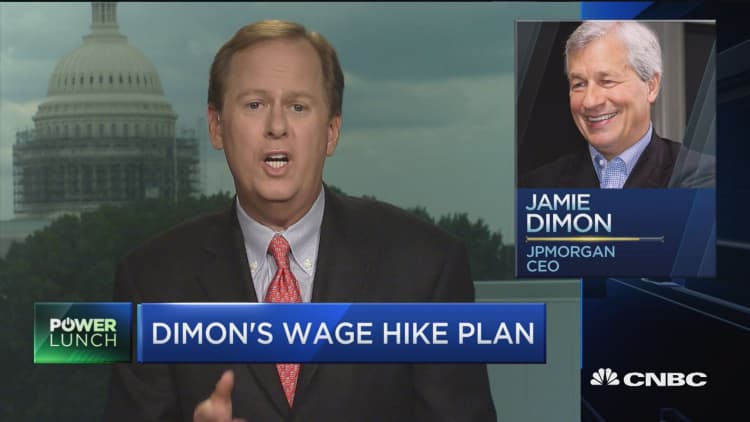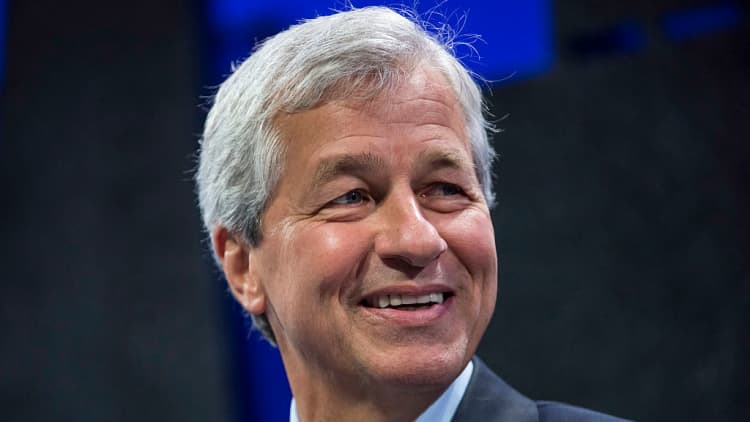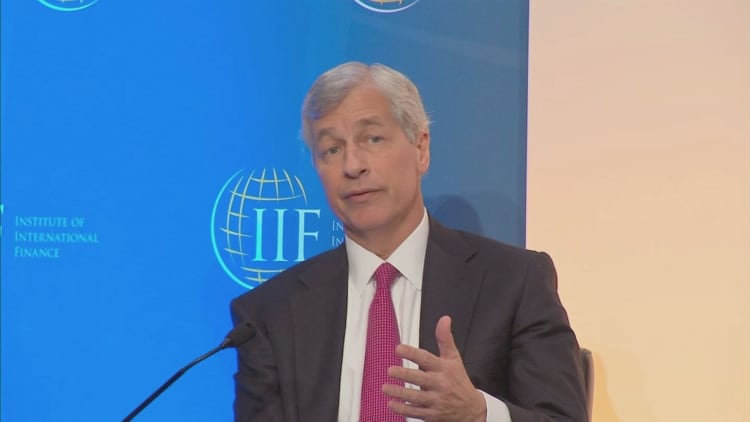


JPMorgan Chase CEO Jamie Dimon's public commitment to raise wages for 18,000 employees may seem like a benevolent act. But that may not be quite right.
Dimon, in The New York Times, said he would raise wages for minimum pay employees, as well as spend more on training and career-oriented education to help them advance.
The move is likely a practical way to retain minimum wage workers in a more competitive and tightening job market, economists told CNBC. They see Dimon's pledge as a sign the economy is moving ever closer to full employment, and when even the banking industry is foreseeing an employment pinch, the U.S. labor market may be getting closer to being healed. Wage growth has been one lagging indicator but has shown a pickup of late.
Issues like these have led approximately two-thirds of Americans to believe that the next generation will be worse off than the last. And it is true that too many people are not getting a fair opportunity to get ahead. We must find ways to help them move up the economic ladder, and everyone — business, government and nonprofits — needs to play a role.Jamie DimonCEO, JPMorgan Chase, writing in the New York Times
Dimon's commentary is the latest sign that employers are seeing evidence that the available labor pool is shrinking and that long-stagnating wages need to go up.
"It's nice to try to lead the way. The labor market is tight and going to get tighter. Our biggest problem going forward is not going to be unemployment, it's going to be a lack of labor," said Mark Zandi, chief economist at Moody's Analytics. "It's not surprising that companies are trying to get out ahead of this and trying to raise wages. He's not the first. You had McDonald's, Wal-Mart, Target and Starbucks."
Zandi said average hourly wages for the first six months of the year have increased 3.2 percent, close to the 3.5 percent the Fed is looking for. While Friday's job report showed a surprise created in June, it also showed a further shaving of new jobs in May — to just 11,000. While economists do not see the June rate as sustainable, they point to a reduction in the long-term unemployed and steady wage growth as some signs the economy is heading to full employment.
"The market is actually leading the way here, but I think there's also a recognition among CEOs that there's this sentiment, probably reasonably placed, that the gap between their pay and other senior executives and those at the bottom of the rung has widened, so they're sensitive to that," said Zandi. "There's some benevolence, but I don't know that it would have happened without the job market leading the way."
Dimon also indicated that what's good for JPMorgan is also good for America. He opened his remarks by commenting that wage stagnation, insufficient training and skills development, a lack of quality education and income inequality have been bad for the country.
That is by no means a new message from Dimon, who said it's the "right thing to do." He has previously said the private sector needs to help with America's ills, and in 2014, JPMorgan invested $100 million in Detroit to help its economy recover.
"Issues like these have led approximately two-thirds of Americans to believe that the next generation will be worse off than the last," he wrote in the Times on Tuesday. "And it is true that too many people are not getting a fair opportunity to get ahead. We must find ways to help them move up the economic ladder, and everyone — business, government and nonprofits — needs to play a role."
Bank analyst Dick Bove said JPMorgan can well afford to raise pay for its workers, as it's the second most profitable U.S. company behind Apple, in the latest Fortune list of most profitable companies. Wells Fargo, Citigroup and Bank of America are also in the top 10.
He also said the stigma surrounding the banking sector after the financial crisis may be a factor pushing JPMorgan to boost compensation in order to keep them as more jobs become available. He expects the other banks to follow.
"Whether you say he's being forced to do this or whether he's doing it from an altruistic basis, the two things are both correct. He is being forced to do it by conditions in the labor market and the economy and you can throw in politics if you want, but he can do it. And he can do it because of the massive expenditures on technology and the changes in the nature of how you deliver banking products has made it possible for the bank to do this," said Bove, vice president of equity research at Rafferty Capital.
But what is interesting is that Dimon, viewed as a leader in the banking sector, is at the forefront of his industry, at a time when competitive and regulatory forces have forced change.
"Our minimum salary for American employees today is $10.15 an hour ... almost $3 above the current national minimum wage," Dimon wrote. "Over the next three years, we will raise the minimum pay for 18,000 workers to $12 to $16.50 an hour, depending on geographic and market factors." Dimon also said JPMorgan will spend $200 million on training for entry-level employees this year, and is expecting to train 30 percent more employees this year, many of whom are tellers.
JPMorgan said that 90 percent of the employees affected by the new policy are located in regions where hourly wages will increase to between $13.50 and $16.50. Workers in the New York City and San Francisco metro areas will see their base pay increase to $16.50 an hour in 2019, while the new base pay for employees in Chicago, Seattle, Los Angeles and Washington will increase to $15 per hour in 2019.
There are about 185,000 JPMorgan employees and those who will benefit from the increase are bank branch tellers and customer service representatives for the consumer and community banking business.
"He's one of the more prominent in an industry where you would not expect it," said Diane Swonk, CEO of DS Economics. She said bank teller employment did not really collapse as automated teller machines took on many of the bank employees' roles, but it did not expand either.
"They did not grow as fast as overall employment. There's a lot of movement where bank branches are being closed and replaced by online banking, and in other places they're being enhanced. This is the question going forward. The industry is restructuring. The regulators would like to make banks utilities and the banks, in their desire to survive and not become utilities, are looking at where they can make money. They're trying to differentiate themselves from pure financial technology-based companies."
As for Dimon's comments on wage increases and training, she said: "I think it's about retention. I would be surprised if they hired that many people." Swonk said average hourly wages for financial activities workers have been increasing lately at a bit more than 2 percent, well below the 4 percent growth seen in leisure, which has the fastest wage growth in the minimum wage sectors.
Financial activities include nonsupervisory workers, at such institutions as banks and insurance companies. The wages were growing at more than 6 percent in 2007, fell sharply in the recession, jumped to a 5 percent increase in 2012 but have been trending at 2 to 3 percent since 2013, she said.
Swonk pointed out that a number of companies that made announcements about wage hikes were already seeing wages rise based on state mandates. She said one area where there could be a loss of jobs is in retail as stores like Macy's and Wal-Mart close locations. Retail wages had gone up more but have seen smaller gains recently.
Dimon noted that JPMorgan's lower-compensated workers also receive a medical plan — subsidized up to 90 percent by the company — along with dental, vision and other health-care coverage. The company also recently raised other benefits, including a 401(k), a pension, a special annual award, paid family leave, paid vacation and bereavement, Dimon said, in the Times op-ed. In total, the annualized value of all of benefits for lower-paid employees averages about $11,000 a year above existing wages.
"Wages for many Americans have gone nowhere for too long," he wrote in the Times. "Many employees who will receive this increase work as bank tellers and customer service representatives. Above all, it enables more people to begin to share in the rewards of economic growth."


